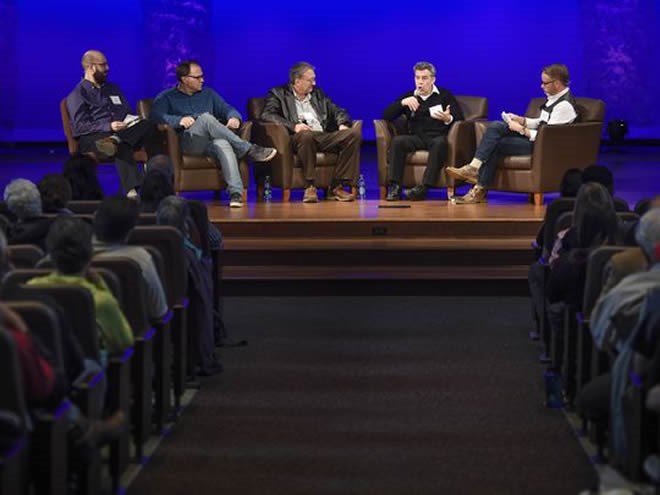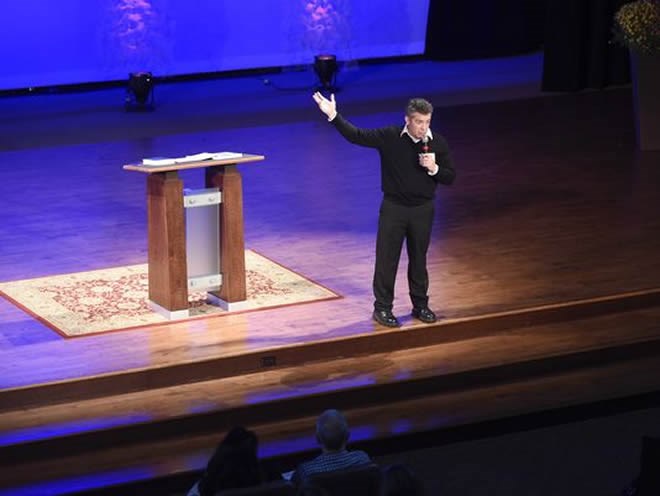
Tuesday, November 01, 2016

Panelists take questions from the audience during an event titled "Understanding Islam and Loving Our Somali Neighbors" held Saturday, Oct. 29, at Calvary Community Church in St. Cloud. The seminar was organized by the St. Cloud Evangelical Network for Transformation, a partnership among nine local churches. (Photo: Dave Schwarz)
In the days following the Sept. 17 attack at Crossroads Center mall, religious leaders from all over the St. Cloud community were visible at multiple press conferences. Christians supported their Muslim neighbors, urging peace and condemning the attack by a Somali-American man who made references to Islam.
Absent were some leaders in the evangelical Christian community.
The Rev. Matthew Molesky, a senior pastor at Calvary Community Church, was concerned. He and other leaders have built relationships with some in the Muslim community, but had still missed out on those plans.
"Because we just reached out to ... the relationships with those leaders, said, hey, how can we help. We want you to know we love you. We would have been there if we would have known about that," he said.
Strengthening those connections between the evangelical community and the Somali and Muslim communities is just one of his objectives, Molesky said.
Several months ago, a few evangelical pastors in the St. Cloud area started to get together to pray and talk about all the tensions in the community, he said, particularly tensions between Muslims and Christians.
"We gathered, not with any clear-cut objective, but just started working in conversations, how can we serve our community well," he said.
Then they started inviting people within their congregations — and evangelical leaders in particular. The group grew.
"We were getting very encouraged of getting to know each other, seeing our church families partner together for the sake of our community, instead of in silos," Molesky said.
"I've been here nine years ... and I've never seen that kind of collegial cooperation before," he said.
They named themselves the St. Cloud Evangelical Network for Transformation. Nine churches have partnered so far: Calvary Community Church, Communion Life Fellowship, Discovery Church, Fellowship Bible Church, Gateway Church, Jubilee Worship Center, Life Assembly of God, Relevant Life Church and Westwood Church.
The group has begun to take concrete steps. Most recently, they had an event, "Understanding Islam and Loving Our Somali Neighbors."
But the group is taking the long view.
"I don't think any of us believe that there are any short-term, quick fixes or anything," he said. "Right now, it's just one seminar."
In coming months, the group hopes to foster and grow relationships with members of the Somali-American community and Muslim community.
Molesky thinks evangelicals are well-suited to reach out.

Michael Neterer speaks on topics of Islam and recent Somali immigrants during a seminar Saturday, Oct. 29, at Calvary Community Church in St. Cloud. (Photo: Dave Schwarz)
"Evangelical is just from the word 'evangel,' or the good news," Molesky said. "We want to love our neighbor and we want to do that based on the truths and doctrines that we hold dear, the truth of understanding who Jesus is and what he teaches."
"We just think that we want to bring a voice to the table and these fundamental truths are bound up in how we're going to serve you," Molesky said.
The Rev. Mark Johnson agrees. He is one of the lead pastors at Jubilee Worship Center and a member of the transformation group.
"I think we've been given a commission to share Christ with everyone and demonstrate Christ's love, and to love one another, love our neighbor," Johnson said. "I think working together we can do more, accomplish more. It's beneficial to have churches work together."
In the Muslim religion the importance of the neighbor is stressed, said Hassan Yussuf, a local Somali leader.
"It's important to make sure they have food, they're sleeping well, their security is guaranteed. In Islam, that is the way we grew up," Yussuf said. "Many people don't understand. Many people think that Muslims care only about Muslims."
Johnson talked about that disconnect as well.
"I think there's a lot of misunderstanding ... there's an assumption (that) all Somalians are a threat or terrorists. We're wanting to help dispel that," Johnson said.
Johnson said the key is to just show more interest in your neighbor, learn about their background and why they're here.
"I think, if we have to live peaceably, we need to learn more about each other ... and guarantee that nothing will happen. It's more proactive and precludes bad things from happening," Johnson said.
Evangelical Christians have to battle negative associations with some groups that call themselves evangelical that are preaching hate and intolerance, especially toward Muslims.
"I think our first response, is yeah, get off of our team," Molesky said. They don't represent the values of the evangelical community.
"A lot of what we're trying to do is seeking to understand, to listen, to realize, to believe, despite the cultural influences," he said.
There needs to be recognition that if those fringe groups don't represent evangelicals, mall attack suspect Dahir Adan doesn't represent the entire Muslim or Somali community.
"They are an outlier people that aren't truly representing our religion," he said. "That's been our experience as we've been doing this, and don't think of it like this monolithic group. It's organic and individual."
He stressed that this group is in the very beginning stages.
"I think what's difficult ... is a somewhat understandable fear. Some of our seminar is trying to address that," Molesky said. "There's a fear that builds in our community, a fear of each other."
Instead, he said, we need to try to understand each other.
"Let's understand and let's love. We need to break through ... and love people. That's what Jesus calls for," Molesky said. "It shows how our fears are irrational."
The next step is to continue developing and deepening relationships.
Johnson said the evangelical community should look at practical ways it can engage and help the Somali-American community. He suggested maybe helping Somali-Americans learn English or establishing ongoing meetings to talk with one another.
"We can look at the needs in the community and the ways we can help with any of those things," Johnson said.
Yussuf said that everyone in the community needs to share resources, and make sure everyone has an opportunity to work and support their family.
"Then, we'll have community integration and community peace," he said.
But Yussuf also stressed that talk isn't enough.
"We need real action. We have all these bridges that are built but people are not crossing the bridges. We just build a fancy bridge and we leave," Yussuf said.
"You need to come across the bridge."